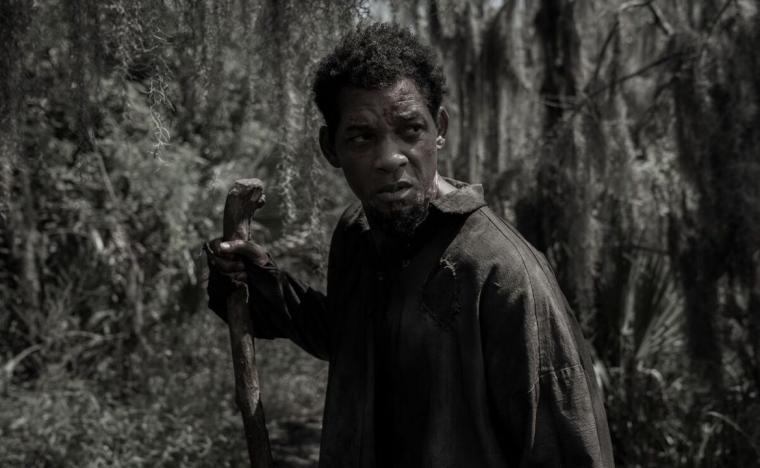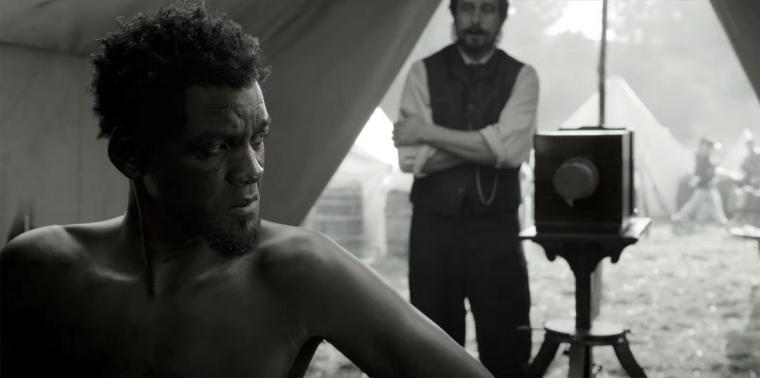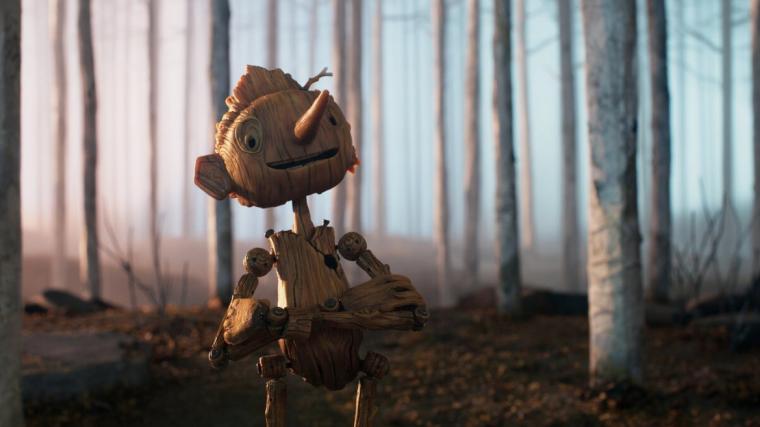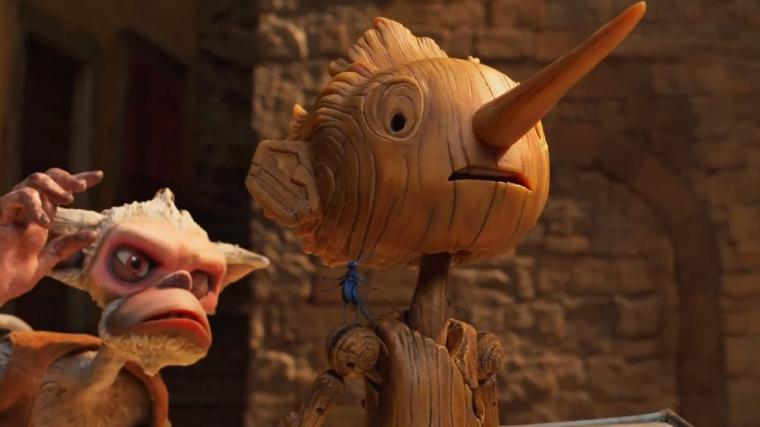
Jim Parsons and Ben Aldridge in Spoiler Alert
SPOILER ALERT
You know a movie about terminal illness is in trouble when it asks you to spend more time feeling sorry for the dying person's caregiver than it does for the person who's doing the dying. That, I'm afraid, was my chief hindrance in enjoying Spoiler Alert, director Michael Showalter's friendly, irritating dramedy about long-term life partners that keeps putting the emotional emphasis on the wrong partner.
This isn't meant as a blight on Jim Parsons, who plays our chief protagonist Michael Ausiello, the real-life former writer for TV Guide and Entertainment Weekly who launched his television-news site TVLine.com in 2011. As Showalter's film demonstrates, he also helped care for his boyfriend and eventual husband Kit Cowan – whom Ausiello began dating in 2001 – until the latter's passing, from neuroendocrine cancer, in 2015. Parsons is inherently likable and funny, has shown considerable dramatic chops in adaptations of The Normal Heart and The Boys in the Band, and is as wry, honest, and subtly affecting here as his material allows. (David Marshall Grant's and Dan Savage's script is based on Ausiello's 2017 memoir Spoiler Alert: The Hero Dies … which is now, I suppose, a Spoiler in itself.) But it's entirely possible that no one on Team Spoiler Alert foresaw how completely and effortlessly Cowan portrayer Ben Aldridge was going to steal the show. Because when we were left alone with Parsons' Michael at the end of the film, I awkwardly realized that what I liked most about him – in the manner of so many couples we've all known – was his more-significant other.
Showalter's early sequences, and they're generally terrific ones, suggest this past fall's Bros for audiences who don't want their endearing gay rom-coms ruined by implications of sex. TV journalist Michael and Manhattan photographer Kit have their Meet Cute at a dance club; their immediate interest ends in a make-out session and a chaste good-night; they finally get a private night together yet keep their underwear on (at least until the fade to black). But mostly they talk, and Showalter and his screenwriters wisely grant Parsons and Aldridge a number of long, unhurried exchanges in which both they and we get to know the guys better. They appear to be learning about one another at the same speed that we're learning about them, and the actors' easy, kinetic rapport produces a euphoric effect – we like Michael and Kit as a couple maybe before they do. That affinity winds up being crucial to Spoiler Alert's moderate success, because it gets us through a number of bum scenarios lying in wait, especially the off-putting, shoulda-been-deal-breaking reveal of Michael's Smurfs obsession, and the accidental, weirdly hostile coming-out exchange between Kit and his parents. (Bill Irwin and Sally Field portray Kit's folks, and the latter, a Steel Magnolias veteran, is a natural at this genre. So is Showalter, who preceded last year's Oscar-winning The Eyes of Tammy Faye with 2017's The Big Sick.)

Principally, though, Kit's fondness for Michael and our fondness for Kit make us like Michael more than we otherwise might have. And this movie needs that to happen, because as presented, the guy is somewhat tough to root for. As Showalter's film is adapted from Ausiello's memoir, it makes sense that Spoiler Alert doesn't provide as full a picture of Kit as it does of Michael, and I admired the script for not pretending that it could. Yet even though we're given therapeutic reasoning for Michael essentially living his life through television as a way to deal with his parents' deaths before he exited puberty, that excuse doesn't fully land. At the very least, it doesn't make up for the sloppily conceived and performed re-enactments of Michael's childhood viewed as a tired '80s sitcom, or the employment of Keri Russell's Felicity as a major life touchstone, or the vision of Kit's demise as a Very Special Episode in Michael's eternal soap opera. I'm not labeling this emotional dishonesty; Auseillo may very well live and breathe pop culture the way Grant and Savage suggest. (In a bit heavily featured in the trailers, Michael can't even request a hospital bed without turning it into a self-aware parody of Shirley MacLaine's famed tantrum in Terms of Endearment.) Despite Parsons' humanizing efforts, though, this Michael comes across as an intensely limited partner, as well as a fundamentally uninteresting one, and sadly, the movie keeps trying to shoehorn us into his corner.
After Michael and Kit have been together for about a decade, they begin to see a couples' counselor. (I was floored upon realizing that this counselor was played by co-screenwriter Grant, the original Joe Pitt in Broadway's Angels in America whom we've barely seen since his adorable Russell Weller on TV's thirtysomething.) Among the boyfriends' litany of complaints, Michael says that Kit is constantly high, which was previously suggested, and Kit says that Michael drinks more than a bottle of wine a night, which is a shock, as Michael was previously a teetotaler whose liquid vice was Diet Coke. (Just like Tammy Faye!) What made Michael start drinking so heavily? Is he planning to curtail the dhabit or stop outright? We're never shown or told. But we are made aware of Kit's adulterous affair, as well as positioned to admire Michael's bravery in looking the other way during casual flirtations, his besties-while-jogging relationship with Kit's mom, and his angelic countenance after inviting Kit's hookup to visit Kit on his deathbed. While Kit is never made to look bad, necessarily, Michael is made to look saintly, and any lingering questions about his validity as a blemish-free Partner for All Seasons are swept conveniently under the rug.
But then there's Kit, and if Spoiler Alert captures your interest and empathy, it'll likely be because of him. Those familiar with British actor Ben Aldridge probably best remember him as Fleabag's unnamed “Arsehole Guy” – that intensely hot hookup, in the show's first series, who adored Phoebe Waller-Bridge's relatively flat chest and, shall we say, inviting posterior, and salivated over a wall-full of Olivia Colman's ceramic penises. (Seriously, if you haven't watched that fabulous, Emmy-winning Brit-com yet, you must.) Yet while employing a pitch-perfect American accent that doesn't sound geographically generic in the Ben Kingsley manner, Aldridge is utterly sensational: spontaneous, frisky, devastatingly sincere, and a phenomenal advertisement for traditionally unflattering eyeglasses. (The actor was also responsible for my one out-loud laugh during the movie, when he speedily, hilariously replied to a lame gag about Michael coming out of the closet.) Aldridge, however, proves as arresting a tragic performer as he is a comedic one, and although Showalter's movie is frequently overwritten, its writers at least know when to shut up and let Aldridge and Parsons quietly share their magical rapport: voicelessly taking one another's photos in a café; sharing a rare communal joint after a particularly heartbreaking diagnosis. Spoiler alert: The film isn't great. Additional spoiler alert: Thanks to Aldridge, I'd watch it again regardless.

EMANCIPATION
Newly streaming on Apple TV+, director Antoine Fuqua's Emancipation finds an emaciated Will Smith, over the course of two-plus hours, torn from his family, beaten, whipped, stabbed, chased, forced into military service, and derided with a series of demeaning epithets, and it's hard to imagine that even Chris Rock would want to witness the film's punishing extremes.
But my chief issue with the movie has nothing to do with its intense violence. It has everything to do with Fuqua's and screenwriter William N. Collage's decision to fashion their slavery drama – one indebted to the heavily circulated 1863 photograph of a former slave's gruesomely scourged bare back – as a heart-pounding action thriller in which every character, from the noblest to the most loutish, comes off as almost garishly one-dimensional. It should go without saying that not every work of this type needs to be 12 Years a Slave. But viewers certainly deserve better than this bayou-set, torture-porn rendition of The Fugitive, with the only respites from the tedious brutality coming from the unintentionally hilarious “agonized” faces Smith makes whenever his runaway has to cauterize one of his wounds or prevent himself from screaming.

Evidently, producer Joey McFarland began doing research for his project in 2018 – though given that no one appears to know even the last name of the former slave Gordon pictured in that famed Civil War photo, one wonders just how much legitimate family history McFarland could have uncovered. Enough, apparently, for his creative team to decree that Gordon – renamed Peter here – was a loving family man with a devoted wife and children who escaped his Louisiana plantation and miraculously evaded and outwitted a group of Confederates before being saved, in the last possible second, by Black Union Army troops. For all I know, Emancipation's story is accurate. It plays, however, as completely phony, employing every possible man-on-the-run action-flick cliché (Smith's Peter even delivers a pithy, Schwarzenegger-ian comeback to his nemesis right before the guy dies), but doing so in the guise of an “important statement” about one of America's most wretched periods of atrocity. Fuqua, Collage, McFarland, Smith, cinematographer Robert Richardson, et al, may very well have been aiming for grandeur and profundity. What they wound up with, however, is something obviously very expensive that feels cheap as hell – an exploitation of horrific tragedy for the purpose of vacuous excitement.
I kind of knew what we were in for the moment Ben Foster showed up, because we've seen variants on his character countless times before. Playing the sadistic Confederate officer hired to hunt down the escaped slave, Foster does it all: he drawls in a deliberate monotone to show his lack of humanity; he casually drops the “N” word with blasé boorishness; he never rides his horse faster than a slow trot yet always seems to be 10 feet from our consistently running hero. For perhaps the first time over more than two decades, I hated every moment spent with Foster here. But then again, there was very little about Emancipation I didn't hate, ranging from the grinning-sumbitch odiousness of the white Southerners to the equally clichéd tortured dignity of Peter's family to Smith's five-alarm acting when scavenging for food, like he's auditioning for the DiCaprio role in a Revenant remake no one asked for. That global phenomenon of Gordon's photograph helped inspire the abolitionist movement. This deeply ill-considered affront should inspire nothing but eye rolls.

GUILLERMO DEL TORO'S PINOCCHIO
Along with Dickens' A Christmas Carol and origin sagas for Batman, Spider-Man, and Superman, the story of Pinocchio is one that I don't feel the need to experience ever again, especially on-screen. Beyond the 1940 Disney achievement that I'm sure holds up just fine, wasn't it a mere two years ago that an Italian version of The Adventures of Pinocchio was released with Roberto Benigni as Geppetto … which followed the 2002 Italian version with Benigni as (insert shudder emoji) Pinocchio himself? And didn't Robert Zemeckis' critically lambasted take on the Carlo Collodi material debut on Disney+ just a few months ago, giving me further reason to never subscribe to Disney+? How many ways can there be to tell this exhaustively covered fairytale?
Well, if you're Guillermo del Toro, it turns out there are at least a few. You can make your retelling a stop-motion-animated entertainment with numerous arresting designs taken from Gris Grimly's 2002 edition of the 1883 novel. You can turn it into a musical, adding soporific songs with arrangements by the score's composer Alexandre Desplat and lyrics, if you can call them that, by Roeban Katz and yourself. (Sample: “All the things my eyes can see / Everything is new to me / Yo dee lo dee lee.” Maybe it sounds better in Spanish.) You can awkwardly advance Collodi's rural 19th-century setting to the Fascist Italy of the 1930s, pepper the screen with warfare, and give a speaking role to Il Duce Benito Mussolini. (“I like puppets.”) You can jettison well-remembered bits involving a talking fox and cat and transformations into donkeys in favor of jackrabbits playing cards in Purgatory and our hero dying, momentarily, after being hit by a car. And you can have your whole movie narrated by a priggish yet slapstick-prone cricket who won't stop prattling on, and who might remind you that, in the original book, Pinocchio killed the creature early on by swatting him with a hammer. Audiences may find themselves aching for hammers of their own.

All of this is to say that Guillermo del Toro's Pinocchio, which just began streaming on Netflix and was co-directed by Mark Gustafson, is a mess, albeit a fascinating, watchable mess. (Whether you'll want to listen to it, particularly when characters burst into song, is another matter entirely.) Readers of the novel will recall that Collodi's material, much of which was reinstated in director Matteo Garrone's 2020 release, is far weirder and more violent than anything imagined in the Disney cartoon. But I'm tempted to say that del Toro's and Patrick McHale's new script is stranger still, turning a wooden boy's simple quests for love and a flesh-and-blood body into a heavy-handed screed against totalitarianism, and adding so much thematic weight – Geppetto, in a drunken rampage, now carves the figure of Pinocchio to resemble his deceased son – that all hope for charm or magic gets lost.
Still, there's a nearly tactile expressiveness to the stop-motion animation, and del Toro, as is his wont, provides memorable images by the truckload, with the hideous Dogfish, twinned blue sprites, and spindly Pinocchio himself gorgeously rendered. Guillermo del Toro's Pinocchio also provides a diverting game of “Guess That Celebrity Voice!”, with the cadences of Ewan McGregor (as that obnoxiously chatty cricket), Christoph Waltz, and Tilda Swinton instantly recognizable, and those of Ron Perlman, John Turturro, Tim Blake Nelson, and Finn Wolfhard less so. No vocal contributions were a bigger shock, though, than the ones employed for the performing monkey Spazzatura, who can only speak through the marionettes he operates on strings, and who mostly communicates through screeches and sounds of the “Ooo ooo! Aaa aaa!” variety. Oh, Cate Blanchett. That gal can play anything.








